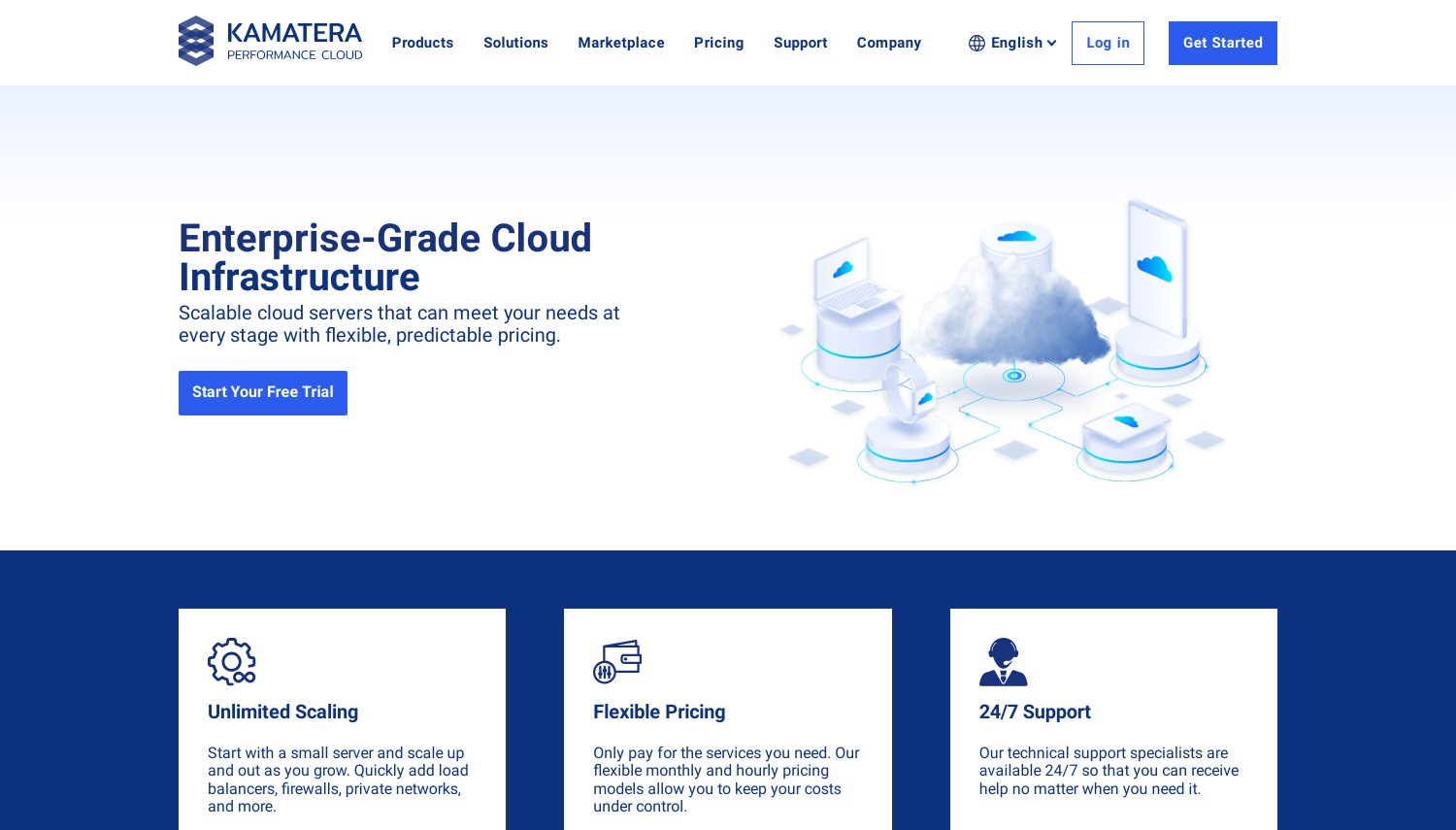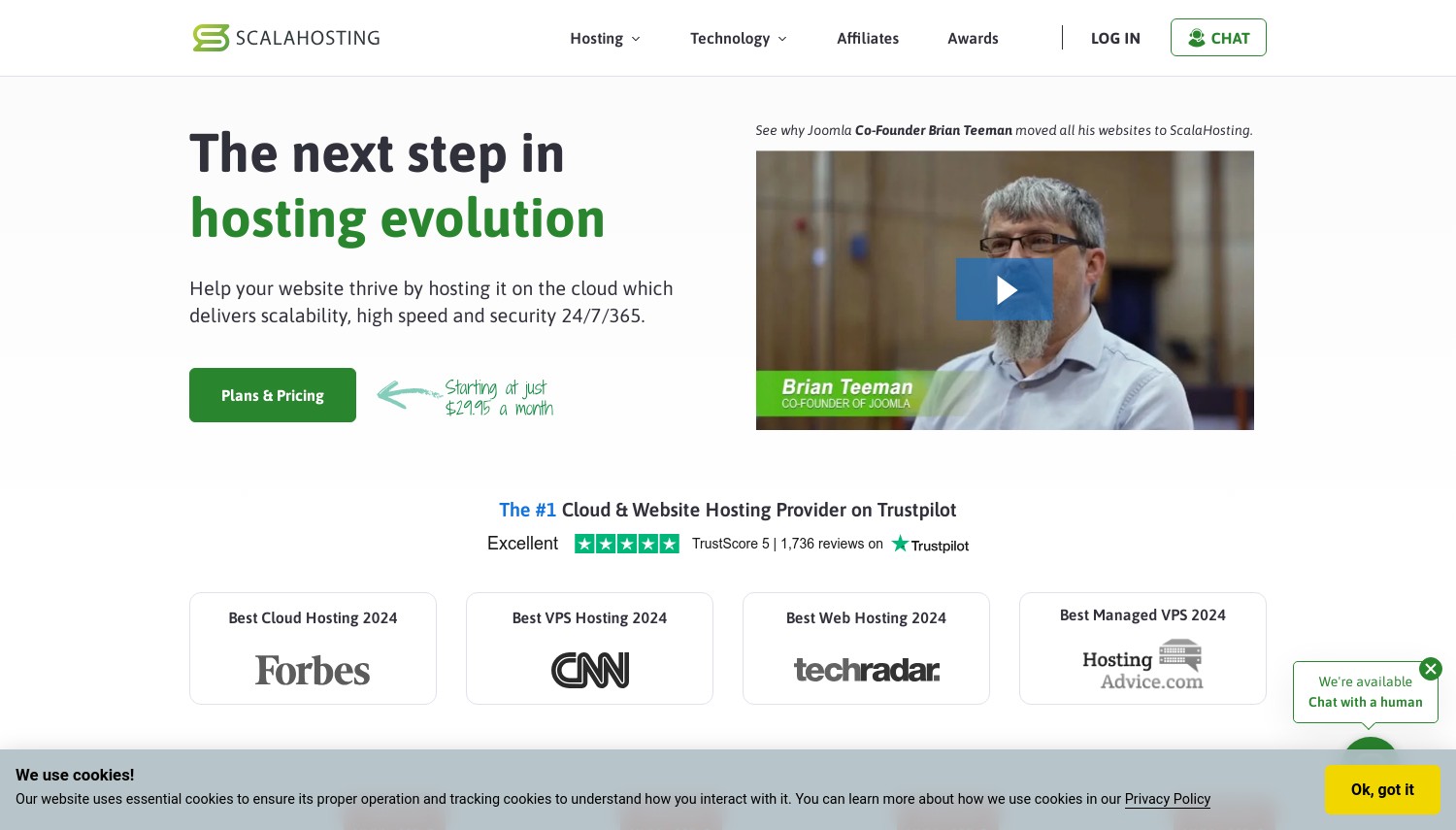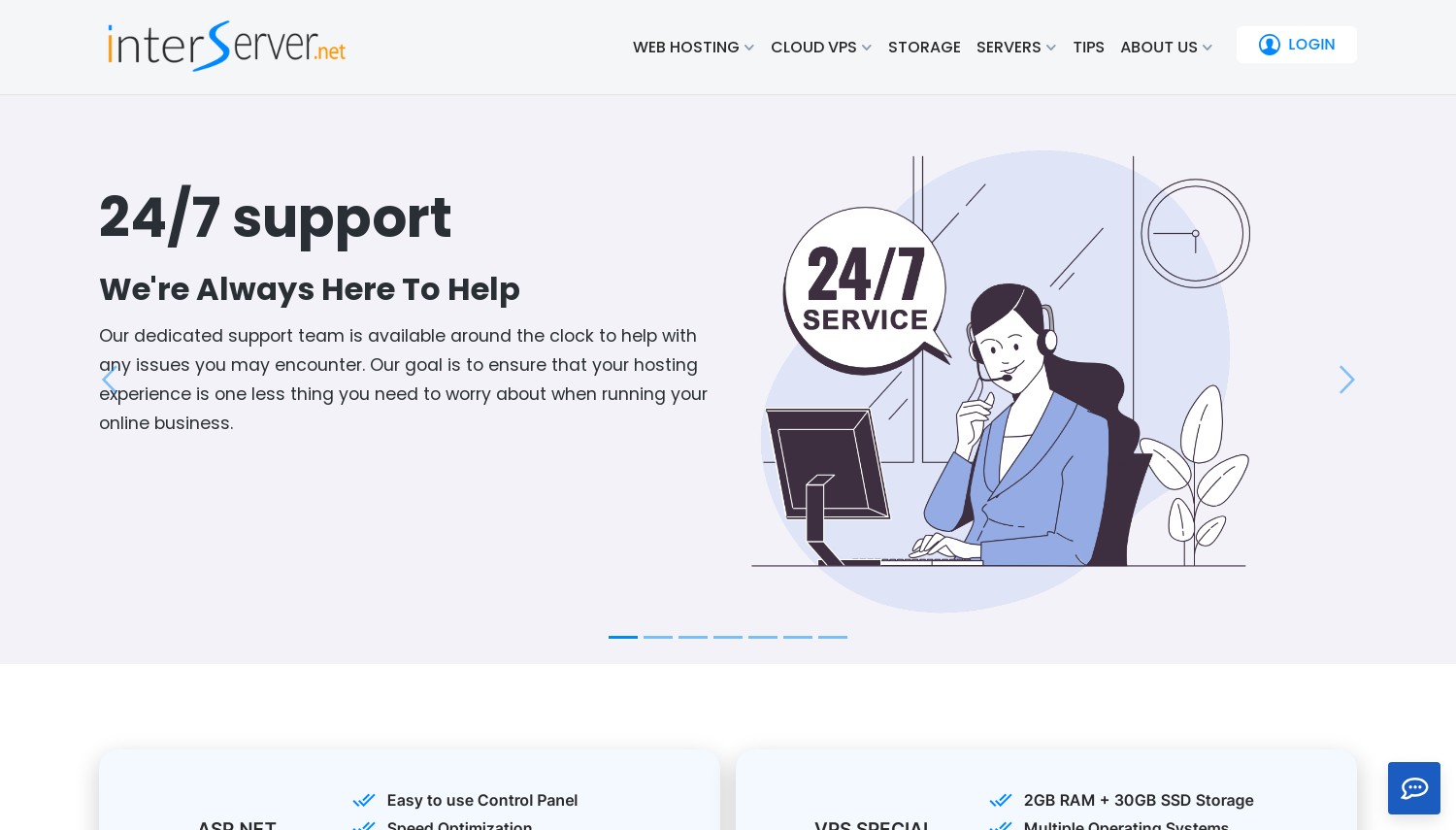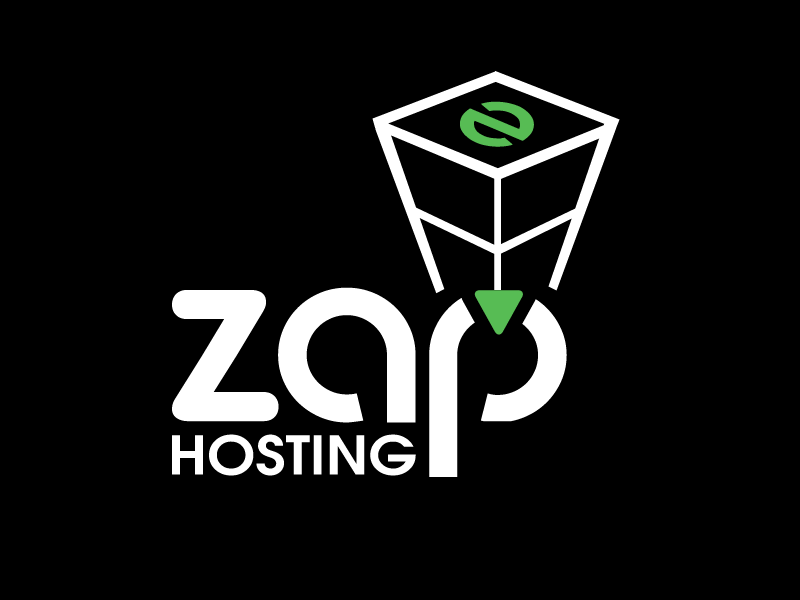6 Best KVM VPS Hosting Services for 2025
What Is KVM VPS?
KVM, which stands for Kernel-based Virtual Machine, is a virtualization technology integrated into the Linux kernel. It allows one to run multiple virtual machines (VMs), each with its own operating system, on a single physical server. VPS, or Virtual Private Server, refers to a virtualized server that behaves like a dedicated server within a larger server. So, when we talk about KVM VPS, it means a VPS solution based on the KVM (Kernel-based Virtual Machine) virtualization technology.Compared to shared hosting, where multiple websites share the same server resources, virtual private servers provide dedicated resources for each user, resulting in better performance and greater reliability. While dedicated servers offer exclusive hardware but at a higher cost, VPS hosting delivers a balance of dedicated resources and flexibility at a more affordable price point.
Key Factors We Look for in Best KVM VPS Hosting Providers
- Performance and Uptime: We at howtohosting.guide consider the performance metrics and uptime guarantees provided by KVM VPS hosts. Look for providers with robust infrastructure, high-speed connectivity, and a commitment to minimal downtime to ensure consistent service availability.
- Support and Scalability: Evaluate the level of customer support and scalability options offered by KVM VPS providers. Responsive customer support is crucial, and the ability to scale resources as your requirements change is essential for long-term flexibility.
| Hosting Provider | Reviews | Overall Rating | VPS Starts from |
|---|---|---|---|
1  Kamatera Kamatera
|
274 |

|
$4.00 / mo. 30 Days free |
2  HostArmada HostArmada
|
1k+ |

|
$2.49 / mo. NOW -80% |
3  Hostinger Hostinger
|
49.3k+ |

|
$4.99 / mo. 75% Off |
4  ScalaHosting ScalaHosting
|
2.1k+ |

|
$14.95 / mo. -78% |
5  InterServer InterServer
|
2.2k+ |

|
$3.00 / mo. NOW 65% off |
6  Contabo Contabo
|
6.9k+ |

|
$4.73 / mo. No Setup Fee |
1. Kamatera


 274
274
 4.2
Positive
4.2
Positive
 Positive
Positive

| Storage | Cpu | Ram | Price | |
|---|---|---|---|---|
| 20 GB | 1 x 2.6GHz | 1 GB | $4.00 / mo. | View Plan |
| 20 GB | 1 x 2.6GHz | 2 GB | $6.00 / mo. | View Plan |
| 30 GB | 2 x 2.65GHz | 2 GB | $12.00 / mo. | View Plan |
2. HostArmada


 1k+
1k+
 4.9
Positive
4.9
Positive
 Positive
Positive

| Storage | Cpu | Ram | Price | |
|---|---|---|---|---|
| 15 GB | 2 cores | 2 GB | $2.49 / mo. | View Plan |
| 50 GB | 1 x 2.2GHz | 2 GB | $29.95 / mo. | View Plan |
| 80 GB | 2 x 2.2GHz | 4 GB | $35.73 / mo. | View Plan |
3. Hostinger


 49.3k+
49.3k+
 4.6
Positive
4.6
Positive
 Positive
Positive

| Storage | Cpu | Ram | Price | |
|---|---|---|---|---|
| 50 GB | 1 core | 4 GB | $4.99 / mo. | View Plan |
| 100 GB | 2 cores | 8 GB | $5.99 / mo. | View Plan |
| 200 GB | 4 cores | 16 GB | $10.49 / mo. | View Plan |
4. ScalaHosting


 2.1k+
2.1k+
 4.9
Positive
4.9
Positive
 Positive
Positive

| Storage | Cpu | Ram | Price | |
|---|---|---|---|---|
| 50 GB | 2 x 3.6GHz | 2 GB | $14.95 / mo. | View Plan |
| 50 GB | 2 x 3.6GHz | 4 GB | $29.95 / mo. | View Plan |
| 50 GB | 2 x 3.6GHz | 4 GB | $39.95 / mo. | View Plan |
5. InterServer


 2.2k+
2.2k+
 4.4
Positive
4.4
Positive
 Positive
Positive

| Storage | Cpu | Ram | Price | |
|---|---|---|---|---|
| 15 GB | 1 core | 1 GB | $3.00 / mo. | View Plan |
| 30 GB | 1 core | 2 GB | $5.00 / mo. | View Plan |
| 30 GB | 1 core | 2 GB | $6.00 / mo. | View Plan |
6. Contabo


 6.9k+
6.9k+
 4.0
Positive
4.0
Positive
 Positive
Positive

| Storage | Cpu | Ram | Price | |
|---|---|---|---|---|
| 400 GB | 4 cores | 6 GB | $4.73 / mo. | View Plan |
| 800 GB | 4 cores | 8 GB | $9.98 / mo. | View Plan |
| 2.3 TB | 6 cores | 12 GB | $14.71 / mo. | View Plan |
HowToHosting.Guide Selected Kamatera Reviews for Kvm, Vps
 Trustpilot User
from Italy
Trustpilot User
from Italy
 Trustpilot User
from Ukraine
Trustpilot User
from Ukraine
 Trustpilot User
from Serbia
Trustpilot User
from Serbia
10 Most Reviewed Kvm Vps Hosting Providers (Aug 2025)
| Hosting Name | User Satisfaction In % | Number of Reviews | Promotions |
|---|---|---|---|
 Hostinger Hostinger |
92% | 58153 | 75% Off |
 ZAP-Hosting.com ZAP-Hosting.com |
94% | 7063 | Visit Site |
 Shinjiru - Malaysia Shinjiru - Malaysia |
96% | 696 | |
 is*hosting is*hosting |
97% | 610 | |
 AbeloHost AbeloHost |
109% | 456 | |
 VPS Malaysia VPS Malaysia |
93% | 246 | |
 Aquatis LLC Aquatis LLC |
93% | 222 | |
 HostZealot HostZealot |
98% | 160 | |
 Shock Hosting Shock Hosting |
99% | 115 | |
 Blueangelhost.com Blueangelhost.com |
80% | 101 | Visit Site |
SSD VPS Hosting Options
SSD VPS hosting has become the go-to choice for website owners who demand high performance, reliability, and scalability from their hosting provider. Unlike traditional hard drives, SSD storage delivers lightning-fast data access, resulting in quicker website loading times and a smoother user experience. Leading VPS hosting providers offer SSD VPS hosting plans that come with dedicated server resources, full root access, and complete control over your virtual server environment.
With SSD VPS hosting, you benefit from improved uptime and enhanced security, making it ideal for businesses and individuals who want their websites to perform at their best. Providers like Hostinger and Liquid Web are known for their affordable SSD VPS hosting plans, offering competitive pricing without compromising on quality.
When choosing an SSD VPS hosting provider, it’s important to evaluate:
- Available server resources
- Storage capacity
- Expertise of the support team
This ensures you get a hosting solution that matches your website’s needs and growth potential. Whether you’re running a small blog or a high-traffic business site, SSD VPS hosting offers the high performance and flexibility required for modern web projects.
Operating Systems for KVM VPS
One of the standout features of KVM VPS hosting is its support for a wide variety of operating systems. VPS hosting providers understand that every project has unique requirements, so they offer a broad selection of operating system templates to suit different needs. Whether you prefer popular Linux distributions like Ubuntu, CentOS, or Debian, or need a Windows-based environment, KVM VPS gives you the freedom to choose the operating system that best fits your application or workflow.
Many VPS providers make it easy to deploy and manage your virtual server by offering pre-configured operating system templates. This allows you to get your server up and running quickly, with the flexibility to customize your hosting environment as needed. Providers such as Server Host and RackNerd are known for their diverse OS options, ensuring that users can find the perfect match for their hosting requirements.
With KVM VPS, you have the power to install, configure, and manage your preferred operating system, giving you full control over your server and the ability to optimize it for your specific use case.
Security and Backup Solutions
Security and data protection are top priorities when it comes to VPS hosting. The best VPS hosting providers offer a comprehensive suite of security features to safeguard your website and data. This often includes:
- DDoS protection to defend against malicious attacks
- Robust firewalls
- Regular malware scanning to keep your virtual server secure
In addition to these proactive measures, reliable backup solutions are essential for peace of mind.
Many VPS hosts provide free backups or easy-to-use snapshot tools, allowing you to restore your website quickly in case of accidental data loss or cyber threats. Providers like Kuroit and CloudServer are recognized for their strong security and backup offerings, helping users maintain a safe and resilient online presence.
When evaluating a VPS hosting provider, be sure to review their security protocols and backup policies to ensure your website is protected against both common and advanced threats.
Performance and Uptime
When selecting a VPS hosting provider, performance and uptime should be at the top of your checklist. High-performance virtual servers ensure that your website loads quickly and can handle traffic spikes without a hitch. VPS hosting providers invest in powerful server resources, advanced network infrastructure, and strategically located data centers to deliver the best possible performance for your website.
Uptime guarantees are another critical factor—after all, your website needs to be accessible around the clock. Leading VPS hosts like Hostinger and Liquid Web are known for their commitment to high uptime and fast, reliable server performance.
When comparing VPS hosting plans, look for providers that offer:
- Clear performance benchmarks
- Strong uptime guarantees
This will help ensure your website remains available and responsive, providing a seamless experience for your visitors.
Customer Support and Expertise
Exceptional customer support can make all the difference in your VPS hosting experience. The best VPS hosting providers offer multiple support channels, such as:
- Live chat
- Phone
Access to technical experts is especially important for managing server administration tasks, troubleshooting issues, and optimizing your hosting environment.
VPS hosts like Server Host and RackNerd are praised for their knowledgeable and responsive support teams, ensuring that users receive timely and effective assistance.
When choosing a VPS hosting provider, consider the expertise and availability of their support staff. A reliable support team not only helps you resolve technical challenges but also empowers you to focus on growing your website and business with confidence.
The Pros of KVM VPS
Below, we have described the main key benefits of using this service:
-
True Virtualization
KVM offers full virtualization, ensuring that each VPS runs its own kernel, which means true isolation from other VMs.
Users can modify their own kernel without affecting other VMs.
-
Customization
Being kernel-based, it allows a wide range of customizations, like using different operating systems including Linux, Windows, and more.
Users have flexibility in installing software, including custom operating systems and applications, and can take advantage of one-click installation options or pre-configured templates to simplify the process.
-
Performance
With KVM, resources are dedicated and not oversold, leading to consistent and predictable performance.
Users can allocate specific CPU cores for their workloads, ensuring optimal processing power and scalability.
It provides near-native performance, as the overhead of virtualization is minimal.
-
Security
Each VM is isolated, meaning one VM’s activities won’t impact another’s, offering enhanced security.
KVM comes with SELinux, adding an extra layer of security to the VMs.
-
Scalability
Easy to scale up or down depending on the requirements, making it ideal for businesses of all sizes.
The Cons of KVM VPS
Underneath, you can see the main drawbacks of using KVM in combination with VPS:
-
Complexity
For those unfamiliar with Linux or virtualization, setting up and managing KVM might be a bit challenging.
-
Overhead
Despite its high performance, there’s still a slight overhead compared to running on bare metal due to the virtualization layer.
-
Cost
KVM VPS hosting might be slightly more expensive than some other virtualization solutions, given its features and capabilities. Be sure to check the actual monthly rate after any promotional discounts, as the ongoing monthly rate can affect the long-term affordability of your hosting plan.
-
Hardware Dependencies
KVM requires hardware (CPU, RAM, etc.) that supports virtualization extensions (like Intel VT or AMD-V).
Conclusion
KVM VPS provides a balanced blend of performance, security, and flexibility. While it might be a tad complex for beginners, its benefits often outweigh the learning curve, especially for businesses looking for reliable and scalable hosting solutions. As with all technologies, it's essential to evaluate your specific needs and expertise before choosing KVM VPS.KVM VPS FAQ
What Is KVM in VPS?
KVM stands for Kernel-based Virtual Machine. It's a virtualization technology integrated into the Linux kernel, allowing the creation of multiple virtual machines, each with its own operating system, on a single physical server.
Do I Need a KVM VPS?
This depends on your specific needs. If you're looking for true virtualization, kernel-level customizations, enhanced security, and consistent performance, a KVM VPS might be ideal for you.
When to Use KVM VPS?
KVM VPS is best used when you need isolated environments for hosting, where each VM runs its own kernel. It's also ideal for applications that require high performance, scalability, and enhanced security.
What Is The Difference Between KVM and VPS?
VPS stands for Virtual Private Server, a general term for a virtualised server. KVM is a specific virtualization technology. When we talk about KVM VPS, it means a VPS solution based on the KVM virtualization technology.
Is KVM Secure?
Yes, KVM VPS offers enhanced security. Each VM is isolated from others, preventing one VM's activities from impacting another. Additionally, KVM integrates with SELinux, providing an extra layer of security.
How Do I Choose The Best KVM VPS Hosting?
When choosing the best KVM VPS hosting, consider factors like performance (CPU, RAM, etc.), scalability, customer support, security features, and pricing. Reviews and testimonials from other users can also be a helpful guide. All of this information can be available using howtohosting.guide's advanced Hosting Finder tool. This tool compares the latest deals for each type of hosting services currently on the market
